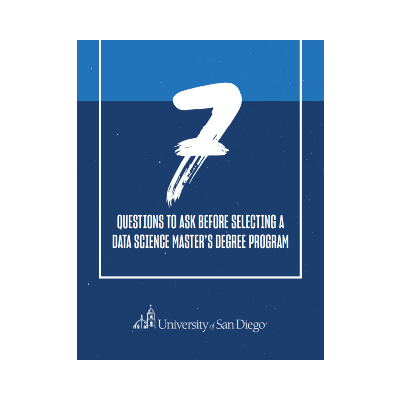Data is everywhere, and as our global population continues to generate more and more data every day, the field of data science continues to grow. One of the most promising and integral roles in the field of data science is the data architect. From 2018–2028, it is expected that the demand for data architects will grow 9%, higher than average for all other occupations.
Curious about becoming a data architect? Check out our career guide for the latest education, salary, and prospective employer information to help you get started in this promising career.
What is a Data Architect?
According to Techopedia, an online technology resource center, a data architect is “an individual who is responsible for designing, creating, deploying and managing an organization’s data architecture. Data architects define how the data will be stored, consumed, integrated and managed by different data entities and IT systems, as well as any applications using or processing that data in some way.”
To put it in layman’s terms, data architects create and oversee the large-scale management plan for an organization’s current and future data. Through these management “blueprints,” data architects ensure that data is always clean, accessible, and secure.
What Does a Data Architect Do on an Average Day?
Because data architects are charged with conceptualizing systems to centralize and protect diverse data, they play a crucial role in helping organizations access and make the most of that data. That requires high-level communication skills as well as an understanding of business goals and initiatives.
As data management systems continue to modernize, data architects are becoming even more in-demand for their ability to build cohesive data centers out of disparate, siloed systems. When different types of data have been stored in different types of systems, it can be very difficult to leverage that information. With a data architect, that data — whether it be human resources data, manufacturing data, web traffic data, financial data, customer loyalty data, geographically dispersed data — can be used to inform endless business functions.
While no two days are likely the same, the day-to-day responsibility of a data architect will be fairly consistent. According to Indeed, you will find many of the same job descriptions and required skills:
- Evaluating current databases and architecture to plan what changes, upgrades, and improvements they need to make
- Creating models and plans for database structures
- Coding and designing databases
- Ensuring that all data is secure
- Ensuring that data structures comply with all local, state, federal, and industry standards and regulations
- Monitoring databases and setting up feedback systems to refine and constantly improve
- Writing and establishing procedures for database management
- Researching new techniques, software, and products that could improve a company’s data-related functions
- Working with marketing teams to create models before product launches
Paths to Become a Data Architect
As you might expect, being a data architect requires comprehensive technology and coding skills, both of which typically require some level of formal education. Most data architect job listings will require a bachelor’s degree at a minimum, with many employers preferring candidates with a master’s degree. In some rare cases, a unique combination of experience and training can qualify an applicant.
For those with a degree and official certification, understand that a data architect is not an entry level position. That means that years of experience in both internships and employment will be crucial for landing a job. Seek out opportunities in programming, IT, database management and design, and data modeling to help build out an appealing resume.
Data Architect Hard Skills & Soft Skills
Data architects must possess a number of technical hard skills and soft skills to be successful in this role.
| Data Architect Hard Skills | Data Architect Soft Skills |
| Data modeling | Communication skills |
| Data policies development | Analytical thinking |
| Data strategy | Time management |
| Data warehousing | Industry knowledge |
| Data querying languages | Ability to multitask |
| Identifying and selecting a system that is best for addressing data storage, retrieval, and management | Attention to detail |
| Database management | Leadership abilities |
| Data visualization tools | |
| Programming languages, such as Python, C, C++ and Java | |
| Tools and technology knowledge about the following programs: Accumulo, Hadoop, Panoply, MapReduce, Oracle, Hive, HBase, MongoDB, and Cassandra, Impala, Oozie, Mahout, Flume, ZooKeeper, Sqoop Linux, PHP. |
Education Requirements for a Data Architect
As we’ve mentioned, a bachelor’s degree is all but a requirement for data architects. While there are few data architecture bachelor’s programs, those interested in the field should consider earning computer science, computer engineering or informational technology degrees. These areas of study will cover relevant topics for data architects, including database systems, data management, operating systems, technology architecture, and systems analysis.
For current and aspiring data architects, a master’s degree is the best way to secure a position or a promotion. It ensures that they’re up to date on the latest technologies and best practices, and it helps position them for leadership positions. Popular master’s programs for data architects include computer science and applied data science.
Beyond formal education opportunities, aspiring data architects could consider pursuing informal education paths, such as:
- Training – Institute for the Certification of Computing Professionals training and workshops
- Certifications – Certified Data Management Professional, Certified Data Professional, IBM Certified Data Architect-Big Data
Data Architect vs. Similar Titles
Data architects fall under the larger umbrella of data science, which can cause some confusion about that job title vs. other roles in the field. Here are just a few data architect-adjacent careers:
Data Engineer — Data engineers are very similar to data architects in that they develop, test, and maintain data systems, but data engineers build systems that are intended for data analysis only.
Data Analyst – Data architects DO NOT analyze data, while data analysts’ primary role is to collect, process, and perform statistical analyses on large datasets.
Data Scientist — Data scientists work with the data systems created by data architects to analyze, process, and model data. They are responsible for interpreting the results to create actionable plans for companies and other organizations.
Industries & Organizations Hiring Data Architects
A simple Google search will show just how in-demand data architects are across countless major industries. Here are just a few of the companies currently seeking highly qualified data architects to join their teams:
- Technology – IBM, Salesforce, Google, Microsoft, Dropbox, Hitachi
- Government – state and federal
- Entertainment – Netflix, ABC, EA, Amazon, eBay
- Finance – American Express, Capital One, Bank of America, Visa, J.P. Morgan
- Healthcare – Health Catalyst, Mass General, Blue Cross/Blue Shield, Philips
- Education – Many colleges and universities (Dartmouth, Harvard, Univ. of Utah, etc.)
- Consulting – Bain & Company, Boston Consulting Group, Booz Allen
Data Architect Career Outlook
Data is arguably an organization’s most important asset, but that’s only true if they have a way to consolidate, access, and analyze it. Enter data architects, the gatekeepers to the data that drives more precise and informed business decisions. This increasing demand is also driving up salary expectations for data architects, creating a positive job market for these professionals.
Data Architect Salaries
According to the U.S. Bureau of Labor Statistics, data architects are experiencing an average salary growth of about half a percent, but with a median salary of $98,860, that percentage equates to a sizable amount. Data architects are typically full-time employees, and their actual salaries will vary depending on their level of education, experience, and the size of the company for which they work.
Though there is not a lot of salary information for a data architect, similar job titles provide an idea of what these professionals typically make:
- Common salary for data warehouse architects in the U.S.: $126,389 per year
- Common salary for senior solution architects in the U.S.: $156,195 per year
- Common salary for software architects in the U.S.: $135,809 per year
- Some salaries range from $49,000 to $273,000 per year
FAQs About Data Architect Careers
Q: What is a data architect?
A: A data architect is someone who designs, creates, deploys, and manages an organization’s data infrastructure. Data architects decide how the data will be stored, consumed, integrated, and managed by relevant parties.
Q: What does a data architect do on an average day?
A: Data architects are typically tasked with evaluating current databases and architecture to plan what changes, upgrades, and improvements are needed. From there, they create models and plans for database structures, monitor those databases, and set up feedback systems to refine and constantly improve.
Q: What skills are required to be a data architect?
A: There are a number of hard and soft skills good data architects should possess. They should be technically sound with comprehensive data modeling, development, warehousing, visualization, and management skills. They should also be knowledgeable about programming languages such as Python, C, C++, and Java, as well as other tech tools like Oracle, Hive, HBase, Impala, Oozie, Mahout, Flume, Sqoop Linux, and PHP.
Q: What are the education requirements for a data architect?
A: Nearly all data architect jobs require a bachelor’s degree minimum, with a master’s degree preferred. In rare instances a combination of skills and experience can replace a formal degree, but degree holders are better positioned for career advancement and leadership roles.
Q: What industries are actively seeking data architects?
A: Technology, government, entertainment, finance, healthcare, education, and consulting, to name just a few.
Q: What’s the average salary for data architects?
A: The average median salary for a data architect is $98,860, but the top 25% of earners are making approximately 126,890 per year, and the top 10% are earning $155,660.
To reach that upper echelon of earning potential, it helps to have a master’s degree. At the University of San Diego, we’re proud to offer a fully online Master of Science in Applied Data Science degree, the ideal program for data architects. Our innovative curriculum and top-notch faculty ensures that our students leave our program ready to enter the field or make a greater impact in their current organization. To learn more about our master’s degree program, please contact us.




